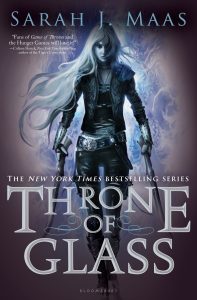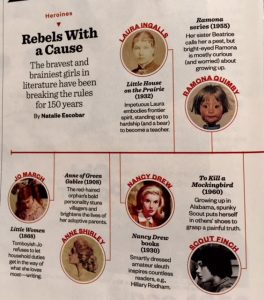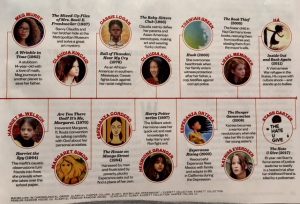The January-February issue of Smithsonian included a two-page spread about books whose heroines changed lives. “The bravest and brainiest girls in literature have been breaking the rules for 150 years.” This resonated with me. Consider the metamessages contained in works of fiction.
![[Source: Sarah J. Maas]](http://vivianlawry.com/wordpress/wp-content/uploads/2018/02/AB-NYT-Cover-197x300.jpg)
You may recall that I recently blogged about fantasy fiction. At the urging of my 13-year-old granddaughter, I agreed to read the Sarah J. Maas Throne of Glass series. It’s fantasy fiction, complete with diabolical evils, biologically created monsters, witches, Fae heroes, magical powers, and a driving determination to save the world. The female protagonist is a trained assassin.

After I finished the series, I talked with my daughter about the metamessages her daughter was likely absorbing from this series. Here, in no particular order, are the points I raised.
—Women can be as strong, capable, super smart, and evil/vicious as any male.
—Men can/should follow a capable woman leader.
![[Source: Sarah J. Maas]](http://vivianlawry.com/wordpress/wp-content/uploads/2018/02/COM-NYT-Cover-197x300.jpg)
—Men can/do admire/love women who are smarter/more capable than they are in at least some ways.
—There isn’t just one person to love. If you lose a love, you can love another.
—The person one loves in youth or in a certain circumstance isn’t likely to be the love of one’s life/soul mate as an adult.
![[Source: Sarah J. Maas]](http://vivianlawry.com/wordpress/wp-content/uploads/2018/02/HOF-NYT-Cover-197x300.jpg)
—Former enemies can become allies or even friends.
—Men and women can be allies and friends even without a love interest.
—Sex should be a loving act, intentional rather than just happen.
![[Source: Sarah J. Maas]](http://vivianlawry.com/wordpress/wp-content/uploads/2018/02/QOS-NYT-Cover-196x300.jpg)
—One can go through some really shitty situations and thrive later.
—Those who are different (witches, Fae, etc., in this series) are accepted or not based on behavior.
—Good people can do bad things or make mistakes.
—Life circumstances are powerful. Bad beginnings can be overcome.
![[Source: Sarah J. Maas]](http://vivianlawry.com/wordpress/wp-content/uploads/2018/02/EOS-Cover-197x300.png)
On the other hand, not all the messages are sterling, feminist, humanist values.
All heroines and heroes are gorgeous! And usually have special/magical powers.
The ends justify the means.
Violence is a way of life.
![[Source: Goodreads]](http://vivianlawry.com/wordpress/wp-content/uploads/2018/02/31450852-198x300.jpg)
No doubt Maas intended at least some of these messages. But all of them? Sometimes readers see things in my work that I didn’t plant intentionally. Bottom line: As a reader AND/OR writer, be aware of the metamessages in literature. What seeds are you planting? What “truths” are you absorbing?

